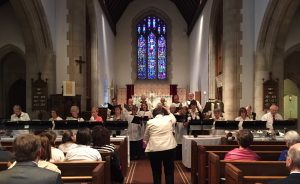This reflection was delivered by Wayne LeFevre on Music Sunday, May 22, 2016, at St. John’s.
Music is well-said to be the speech of angels.
–Goethe
Those words were written by the late 18th century/early 19th century German poet and dramatist, Goethe.
Paul Reese phoned me on Thursday morning and asked if I would share with you my view, as a worshiper in the pew, of the music of St. John’s. Now, I’m not just an average worshiper in the pew because for nearly 40 years, I was a professional church organist. So, my view is slanted toward the organ, the organist, and the organist’s support and encouragement of the congregation’s participation in the music of the worship service. This, of course, involves the congregational hymns and, in our case, the sung portions of the order of the mass.
The church organist’s most important role is the accompaniment of the congregation’s hymns and service music. The organist must inspire the congregation to sing. Paul does exactly that magnificently! Sunday after Sunday! Paul has made St. John’s a singing a church. What he does for our singing is phenomenal! The manner by which he introduces the hymns, the way he accompanies them with his exquisite and constantly changing tonal colors and spirit-lifting tempi, he inspires us to want to sing! He makes us fly, and we leave here every Sunday, refreshed and renewed.
Have you noticed—and at this I never cease to marvel—how Paul interprets musically the text of each stanza of a hymn, bringing its message to vibrant, meaningful life? I hear this nowhere else. Not at Washington National Cathedral; not at either St. Patrick’s Cathedral or St. John the Divine in New York City. And not here in Lancaster at the Big 3: First Presbyterian, Trinity Lutheran, and St. James Episcopal. No! But here—yes!
And that is also true of the psalm which we chant every Sunday. Case in point: last Sunday’s psalm—Psalm 104.
Verse 30: You hide your face, and they are terrified; you take away their breath, and they die and return to their dust. Paul used a dark color on the organ for that verse. A dark, menacing, and threatening color. The organ was grumbling and growling.
Then, Verse 31: You send forth your Spirit, and they are created; and so you renew the face of the earth. And the organ was at once warm, assuring, embracing.
The final stanzas: I will sing to the Lord as long as I live; I will praise God while I have my being. May these words of mine please him; I will rejoice in the Lord. Bless the Lord, O my soul. Hallelujah! And the organ was shouting with joy! And it is all done with the most admirable dignity and reverence.
I dare not forget Paul’s blazing organ fanfares sweeping the Gospel procession from the middle of the nave back through the chancel and into the sanctuary. All of which leaves this old organist feeling that he is standing at the gate of Heaven!!
Now, back to the hymns.
Some of you have undoubtedly been in the same situation in which I sometimes find myself…visiting a strange, unfamiliar church. The organ, from beginning to end—prelude, hymns, postlude—it all sounds exactly the same, with not a bit of variation in the tempo or tonal color. It’s all dah-dee-dah-dee-dah-dee dah! A gray flannel sameness throughout. And those are the churches which invariably have hymns of 5 to 8 stanzas. And by stanza 3, I’m frantically looking about for the nearest exit! And I have taken that exit on several occasions.
In contrast, here at St. John’s, Sunday after Sunday, I’m seated down front. And we stand for the singing of the hymn. And I listen. As the hymn progresses and Paul gradually increases the organ’s volume, and its tonal color builds ever more brilliant and majestic, I hear all of you behind me coming right along with him, brightly and boldly, keeping pace with him. I stand there, listening, grinning from ear to ear, my eyes brimming over with tears of joy and exhilaration and thanksgiving for this unbelievably gorgeous setting—this church, for that king of instruments standing up there, and for Paul Reese.
We are extraordinarily fortunate, fortunate beyond measure. Thanks be to God!!

